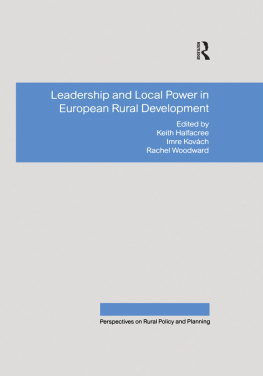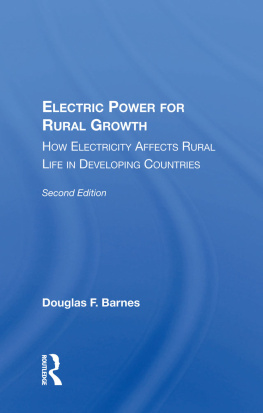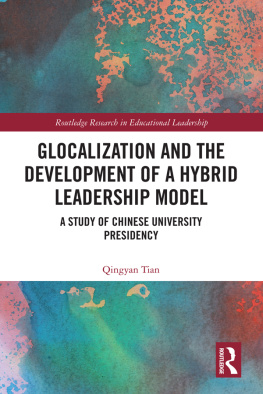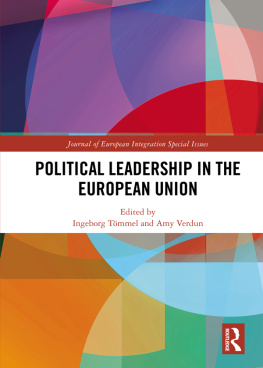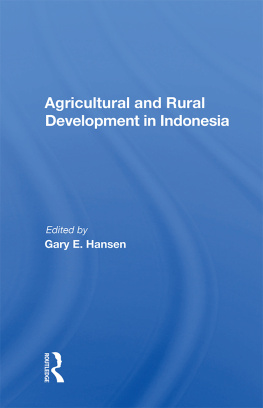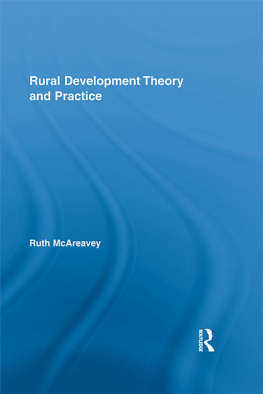First published 2002 by Ashgate Publishing
Published 2017 by Routledge
2 Park Square, Milton Park, Abingdon, Oxon, OX14 4RN
711 Third Avenue, New York, NY 10017, USA
Routledge is an imprint of the Taylor & Francis Group, an informa business
Copyright Keith Halfacree, Imre Kovch and Rachel Woodward 2002
All rights reserved. No part of this book may be reprinted or reproduced or utilised in any form or by any electronic, mechanical, or other means, now known or hereafter invented, including photocopying and recording, or in any information storage or retrieval system, without permission in writing from the publishers.
Notice:
Product or corporate names may be trademarks or registered trademarks, and are used only for identification and explanation without intent to infringe.
British Library Cataloguing in Publication Data
Halfacree, Keith
Leadership and local power in European rural development. -
(Perspectives on rural policy and planning)
1. Rural development - Europe 2. Political leadership -
Europe 3. Local government - Europe
I.Title II.Kovach, Imre III.Woodward, Rachel
307.1212094
Library of Congress Control Number: 2001095872
ISBN 13: 978-0-7546-1581-1 (hbk)
Contents
Keith Halfacree, Imre Kovach and Rachel Woodward
Chris Curtin and Tony Varley
Henri Goverde and Henk de Haan
Rachel Woodward and Keith Halfacree
Imre Kovch
Nicole Mathieu and Philippe Gajewski
Lutz Laschewski, Parto Teherani-Krnner and Titus Bahner
Fernando Garrido, Jos R. Maulen and Eduardo Moyano
Thomas Dax and Martin Hebertshuber
Torsti Hyyrylinen and Eero Uusitalo
Nina Gunnerud Berg and Hans Kjetil Lysgrd
Keith Halfacree, Imre Kovch and Rachel Woodward
Guide
Titus Bahner is a lecturer in the Faculty of Economics at the University of Witten-Herdecke in Germany.
Nina Gunnerud Berg is an Associate Professor in the Department of Geography at the Norwegian University of Science and Technology (NTNU) in Trondheim, Norway.
Chris Curtin is a professor and head of the Department of Political Science and Sociology at the National University of Ireland, Galway.
Thomas Dax is the Deputy Director of the Federal Institute for Less-Favoured and Mountainous Areas in Vienna, Austria.
Philippe Gajewski is Doctorant at the Laboratoire des Dynamiques sociales et recomposition des espaces, University of Paris X, France.
Fernando Garrido is a Researcher in the Andalusia Institute for Social Studies (IESA-CSIC) in Cordoba, Spain.
Henri Goverde is Associate Professor in Public Administration in the Faculty of Management Sciences at the University of Nijmegen, and Professor of Political Science at Wageningen University, both in the Netherlands.
Henk de Haan is a professor in the Rural Sociology Group, Department of Social Sciences at Wageningen University in the Netherlands.
Keith Halfacree is a Lecturer in the Geography Department of the University of Wales, Swansea.
Martin Hebertshuber is a freelance researcher and member of Helix Research and Consulting, based in Salzburg, Austria.
Torsti Hyyrylinen is a Senior Researcher at the Mikkeli Institute for Rural Research and Training at the University of Helsinki in Finland.
Imre Kovch is Head of Department at the Institute for Political Sciences at the Hungarian Academy of Sciences in Budapest, Hungary.
Lutz Laschewski is a Researcher at the Institute for Agricultural Economics and Social Sciences in the Agricultural and Horticultural Faculty of the Humboldt University in Berlin, Germany.
Hans Kjetil Lysgrd is a researcher at the Agder Research Foundation in Kristiansand, Norway.
Nicole Mathieu is Director of Research at the CNRS, working in the Laboratoire des Dynamiques sociales et recomposition des espaces, University of Paris X, France.
Jos Ramn Maulen is a Lecturer in the Department of Sociology 2, University of the Basque Country in Bilbao, Spain.
Eduardo Moyano is the Deputy Director of the Andalusia Institute for Social Studies (IESA-CSIC) in Cordoba, Spain.
Parto Teherani-Krnner is head of the Gender Research Unit at the Institute for Agricultural Economics and Social Sciences in the Agricultural and Horticultural Faculty of the Humboldt University in Berlin, Germany.
Eero Uusitalo is a Councillor for Rural Development in the Finnish Ministry of Agriculture and Forestry.
Tony Varley is a lecturer in the Department of Political Science and Sociology at the National University of Ireland, Galway.
Rachel Woodward is a Senior Research Associate in the Centre for Rural Economy at the University of Newcastle upon Tyne in the UK.
This volume is the outcome of a series of meetings between the contributors, meeting as Working Group 5: Leadership and Local Power. These meetings were financed under the European Commissions COST Action A12 on Rural Innovation. The contributors would like to acknowledge the support granted to the group under this programme, which enabled these meetings to take place.
Rachel Woodward would like to thank Emma Paisley and Caroline Faddy in the Department of Agricultural Economics and Food Marketing, University of Newcastle, for their assistance in the preparation of the manuscript.
The editors would like to thank Pat FitzGerald for her typesetting assistance in the preparation of the final manuscript.
Chapter One
Introduction: A Comparative European Perspective
Keith Halfacree, Imre Kovch and Rachel Woodward
Rural Restructuring and the Reconfiguration of Power Relations
It is a truism that contemporary processes of economic, social, political and cultural restructuring, many of which are global in origin, are having pronounced impacts on the form and function of rural areas across Europe. Whilst these processes may be broadly similar in origin, their outcomes are highly differentiated across space. This diversity of outcomes reflects local, regional and national responses to the challenge of restructuring, visible in the differential geographical impact of economic and social changes, the policies that have been developed to meet these challenges and the ways in which different national traditions have responded to processes of restructuring. The challenges of restructuring are particularly problematic for Europes rural areas, given the scale of changes in modes of agricultural production and the specific problems economic and social trends have raised for rural localities. Indeed, the importance of both agricultural and rural development policy initiatives within the European Union (EU) is indicative of the significance and specificity of the problems of rural restructuring. A point of departure for this volume is the recognition both of the significance of pan-European economic and social changes, and of the significance of such changes for rural areas. Its starting-point is the tension between diversity and homogeneity, between local responses and global processes.
These broad processes of economic and social change in Europes rural areas have consequences for local configurations of power, and for local political responses to these broad processes. The study of these configurations and responses is important. These economic and social changes have produced pronounced inequalities across space which in turn have prompted responses (and perceptions) at national and EU levels of the need for economic and social intervention or development. (Marsden, 1998 and 1999; Bell and Lowe, 1998; Starosta et al., 1999). One policy challenge across the EU is the production of a coherent Europe of the Regions which strikes a balance between the specificity of local conditions and experiences, and normative desires for economic prosperity and stability across Europe (Woods, 1998). Moreover, with the retreat from the top-down (exogenous) model of development at national and EU levels (for political, pragmatic and ideological reasons), local responses have gained in significance. As Granberg and Kovch (1998) and Tovey (1998) argue, local actors play a key role in determining responses to restructuring, and the identification of such actors and their roles constitutes a specific research question in European rural studies. Furthermore, certain policy shifts (such as the adoption by the EU of the model of endogenous rural development) have accorded greater (and ever-increasing) significance to the work of local actors and the operation of local networks of power (Murdoch and Marsden, 1994; Shucksmith, 2000). Quite simply, the local is of increasing significance in EU development programmes; LEADER, for example, is viewed as a template for future EU development policy programmes (Ray, 2000). With this institutional emphasis on endogenous development comes an imperative to investigate the influences on local political configurations, power relations and the way they shape local responses to global processes (de Haan and van der Ploeg, 1994; Ray, 1999a, 1999b; Goverde et al., 2000). Who controls and who benefits from changing power relations as a consequence of development initiatives (Bruckmeier, 2000; Buller, 2000; Kovch, 2000; Osti, 2000; Ray, 2000)? Finally, the study of local configurations of rural power and local responses to restructuring are of wider interest because of what they tell us about cultural issues such as the construction of national and regional identities (Woods, 1997). These identities are influenced across Europe by rural images and constructs; it is pertinent, therefore, to see how these identities are developed and mobilised at the local level within a rural context (Halfacree, 1993; Halfacree, 1995; Hoggart et al., 1995; Pratt, 1996; Frouws, 1998). This volume therefore constitutes a contribution to a growing body of research on local responses, local actors, questions of leadership, power, autonomy and control in the evolution of responses to wider economic and social restructuring across rural Europe. Its purpose is to examine the diversity of these local political responses with specific reference to the implications of these responses for local configurations of power in rural areas.

